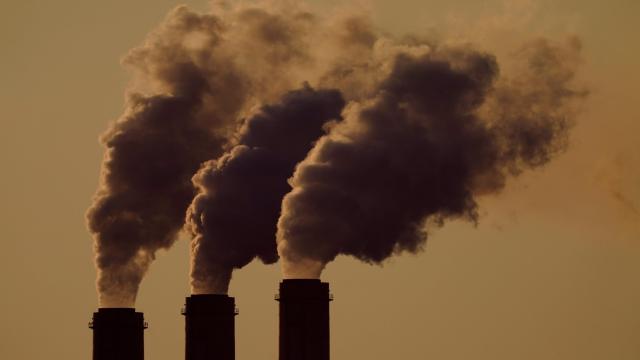Oil and gas companies keep saying they’re committed to the goals of the Paris Agreement. They keep making net zero promises. They touting high-tech solutions they’re working on. It may feel like most of it is bullshit, but not we have the science to prove it.
In a study published Thursday in Science, a team of researchers found that of the world’s largest 52 publicly traded oil and gas companies, just a little more than half of them had made some sort of pledge to reduce their emissions. Of those companies that made promises, the study found, only two companies’ plans actually are enough to keep them in line with the goals set out in the Paris Agreement.
To figure out just how far companies were actually pushing themselves to change their polluting ways, the researchers first collated the lifecycle emissions of all the companies in the study. Most of the companies reported Scope 1 and Scope 2 emissions — emissions created during extraction and refining of their products — but only 23 of the 52 companies accounted for what’s known as Scope 3 emissions, or emissions from actually using all that oil and gas. Scope 3 emissions are far and away the lion’s share of the industry’s emissions. Researchers estimated them by gathering information on companies’ sales of different types of oil and gas and then working out the emissions and energy content of those sales.
“The purpose is to test how ambitious companies’ stated climate goals actually are,” said Simon Dietz, lead author of the study and professor at the London School of Economics, in an email. “They need to match or even outperform the industry-wide scenarios. Mostly they don’t.”
Even then, there still was a big gap in data. Only 28 of the 53 companies provided enough information on current emissions targets and energy data for the team to create a projection of what the future of the company could look like, emissions-wise, if they stuck to the current promises they made. For those 28 companies, the researchers used these numbers to calculate the future emissions these companies will create under their new goals by 2050, comparing these pathways to benchmark pathways to keep warming below Paris agreement targets, based on IPCC science.
The results, predictably, are pretty bleak. Only two oil companies — Occidental Petroleum and Shell — have even set targets to stay within the 2 degrees Celsius (3.6 degrees Fahrenheit) goal set out in the Paris Agreement. Of those two companies, only Occidental’s plan gets them below the 1.5 degree Celsius (2.7 degrees Fahrenheit) target.
“I think one of the key things we are trying to show is that some company targets, which might appear to be ambitious in the sense of being labelled as ‘net zero’ or ‘Paris-aligned’, aren’t necessarily those things at all,” Simon said.
It’s also important here to note that the analysis is constrained by the measurement only of decarbonization by unit of energy sold — what’s known as emissions intensity, the favoured mode of emissions reductions measurements that oil and gas companies generally use. (The authors explain that they used this type of measurement to streamline the analysis and make sure the numbers all line up.) There are many problems with using emissions intensity versus absolute emissions, the other metric we use when we talk about emissions.
Namely, there are scenarios in which a company could produce more oil and gas, creating more absolute emissions even as it lowers the intensity of emission per barrel of oil. As the authors note, there are a bunch of other effective ways to reduce emissions that can’t be measured in this analysis because they don’t include the emissions intensity metric — including ramping down oil and gas production altogether.
Even if the analysis can’t measure what might actually be best for the planet (the answer is eliminating all fossil fuels), it does do a lot of good work in cleaning up some of the doublespeak coming from the industry. Oil and gas companies love to talk about how they support the Paris Agreement and are committed to climate action. And, as the authors point out in the paper, stakeholders of these companies also have a vested interest in knowing if these promises actually, you know, mean anything.
“I think it’s a reality check,” Dietz said. “The sector needs to undergo a big transformation if we’re going to limit global warming. Very few companies are currently planning on making it.”
